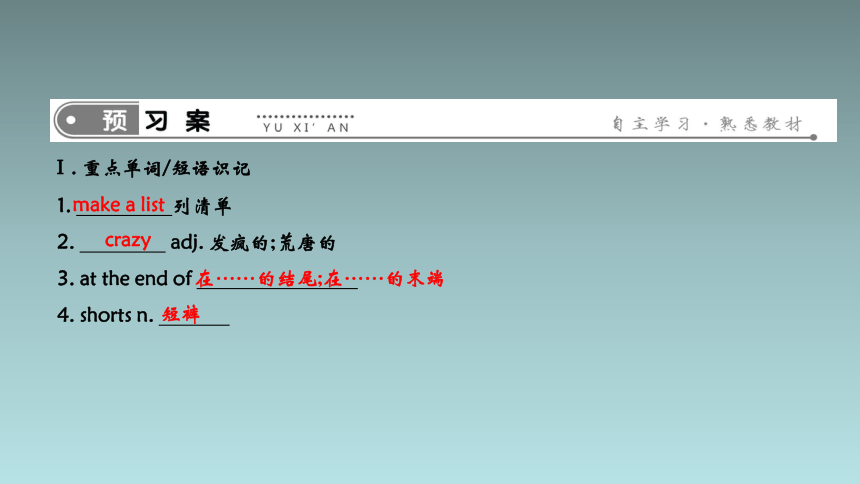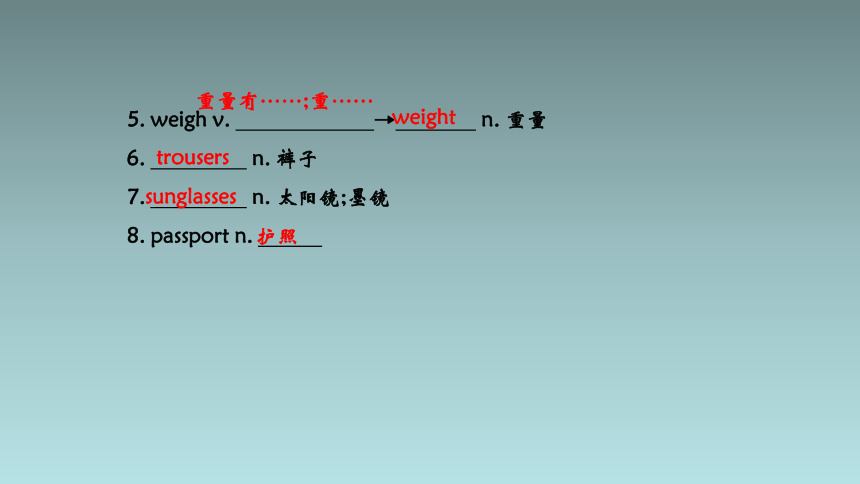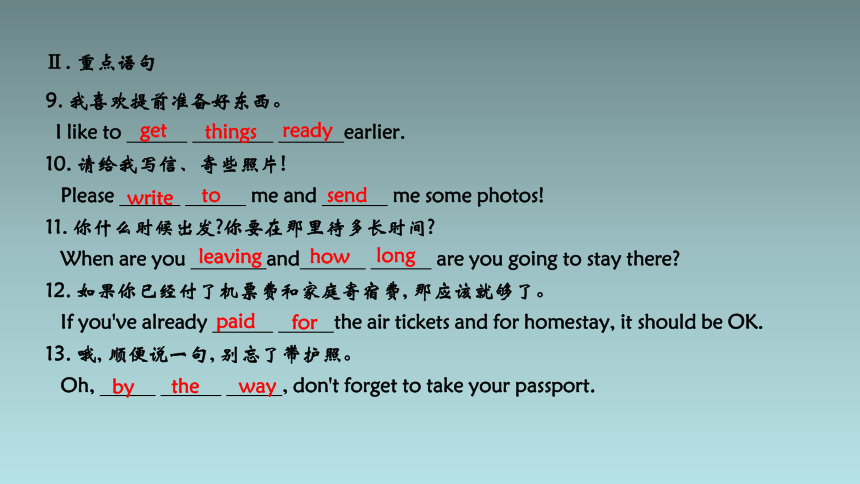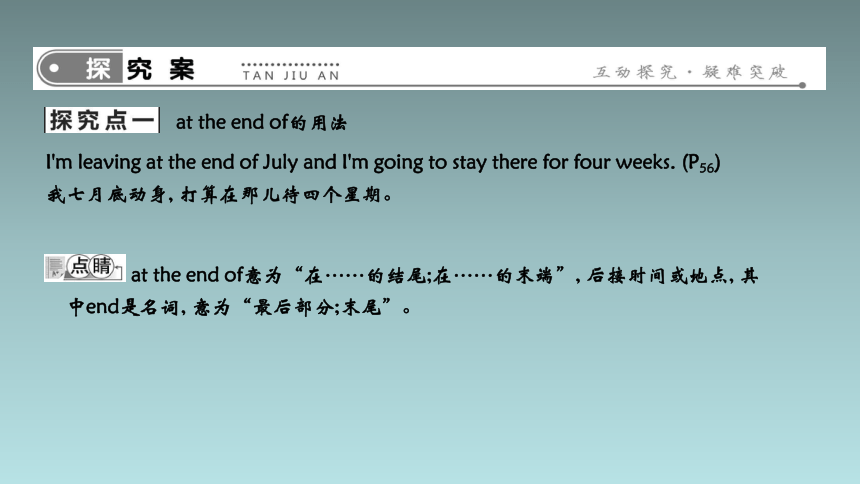外研版八年级下册Module7Summer in Los Angeles Unit1 Please write to me and send me some photos!课件(共13张PPT)
文档属性
| 名称 | 外研版八年级下册Module7Summer in Los Angeles Unit1 Please write to me and send me some photos!课件(共13张PPT) |

|
|
| 格式 | ppt | ||
| 文件大小 | 1.1MB | ||
| 资源类型 | 教案 | ||
| 版本资源 | 外研版 | ||
| 科目 | 英语 | ||
| 更新时间 | 2022-06-16 10:38:10 | ||
图片预览






文档简介
(共13张PPT)
Module 7 Summer in Los Angeles
Unit1 Please write to me and send me some photos!
重难点课件
Ⅰ. 重点单词/短语识记
1. 列清单
2. adj. 发疯的;荒唐的
3. at the end of
4. shorts n.
make a list
crazy
在……的结尾;在……的末端
短裤
5. weigh v. → n. 重量
6. n. 裤子
7. n. 太阳镜;墨镜
8. passport n.
重量有……;重……
weight
trousers
sunglasses
护照
9. 我喜欢提前准备好东西。
I like to earlier.
10. 请给我写信、寄些照片!
Please me and me some photos!
11. 你什么时候出发 你要在那里待多长时间
When are you and are you going to stay there
12. 如果你已经付了机票费和家庭寄宿费, 那应该就够了。
If you've already the air tickets and for homestay, it should be OK.
13. 哦, 顺便说一句, 别忘了带护照。
Oh, , don't forget to take your passport.
Ⅱ. 重点语句
get
things
ready
write
to
send
leaving
how
long
paid
for
by
the
way
at the end of的用法
I'm leaving at the end of July and I'm going to stay there for four weeks. (P56)
我七月底动身, 打算在那儿待四个星期。
at the end of意为“在……的结尾;在……的末端”, 后接时间或地点, 其中end是名词, 意为“最后部分;末尾”。
1. in the end意为“最后”, 相当于finally和at last。
We finished the work in the end. 最后, 我们完成了工作。
2. by the end of意为“到……末”, 往往含有“不迟于”的意味。后接表将来时
的时间, 句子用一般将来时或将来完成时;后接表现在的时间, 句子用现在完成时;
后接表过去的时间, 句子用过去完成时。
By the end of this week , I have already written two books.
到这个星期末, 我已经写了两本书。
1. 在这个月末, 我们就要出发去伦敦了。
this month, we are leaving for London. 2. 到下个月末, 我将读完这本书。
next month, I will finish reading this book.
3. 这位作家的小说终于出版了。
The writer's novel came out .
At
the
end
of
By
the
end
of
in
the
end
if引导的条件状语从句的用法
If you've already paid for the air tickets and for homestay, it should be OK. (P56)
如果你已经付了机票费和家庭寄宿费, 那应该就够了。
if引导的条件状语从句, 如果主句是一般将来时态, 从句要用一般现在时态表示将来。
1. We will achieve our China Dream we work hard and never give up.
(2018资阳)
A. and B. so C. if D. but
2. You will see many aunts dancing together on the square if it in the evening.
A. doesn't rain B. rains
C. will rain D. won't rain
weigh的用法
Your bag mustn't weigh too much. (P56)
你的包一定不能太重。
weigh是动词, 意为“重量有……;重……”。
weight是名词, 意为“重量”。
—What's the w of the elephant
—About two tons.
eight
had better do sth. 的用法
You'd better ask the travel company about the total weight for all your bags. (P56)
你最好问问旅游公司关于你行李总重量的事情。
had better do sth. 意为“最好做某事”, 它的否定结构是
had better not do sth. 意为“最好不要做某事”。
1. It's getting dark. You'd better out by yourself. It's dangerous.
A. not go B. not to go C. to go
2. You'd better too much chocolate, or you'll get fat fast.
A. not to eat B. not eat
C. not eating D. no eat
Module 7 Summer in Los Angeles
Unit1 Please write to me and send me some photos!
重难点课件
Ⅰ. 重点单词/短语识记
1. 列清单
2. adj. 发疯的;荒唐的
3. at the end of
4. shorts n.
make a list
crazy
在……的结尾;在……的末端
短裤
5. weigh v. → n. 重量
6. n. 裤子
7. n. 太阳镜;墨镜
8. passport n.
重量有……;重……
weight
trousers
sunglasses
护照
9. 我喜欢提前准备好东西。
I like to earlier.
10. 请给我写信、寄些照片!
Please me and me some photos!
11. 你什么时候出发 你要在那里待多长时间
When are you and are you going to stay there
12. 如果你已经付了机票费和家庭寄宿费, 那应该就够了。
If you've already the air tickets and for homestay, it should be OK.
13. 哦, 顺便说一句, 别忘了带护照。
Oh, , don't forget to take your passport.
Ⅱ. 重点语句
get
things
ready
write
to
send
leaving
how
long
paid
for
by
the
way
at the end of的用法
I'm leaving at the end of July and I'm going to stay there for four weeks. (P56)
我七月底动身, 打算在那儿待四个星期。
at the end of意为“在……的结尾;在……的末端”, 后接时间或地点, 其中end是名词, 意为“最后部分;末尾”。
1. in the end意为“最后”, 相当于finally和at last。
We finished the work in the end. 最后, 我们完成了工作。
2. by the end of意为“到……末”, 往往含有“不迟于”的意味。后接表将来时
的时间, 句子用一般将来时或将来完成时;后接表现在的时间, 句子用现在完成时;
后接表过去的时间, 句子用过去完成时。
By the end of this week , I have already written two books.
到这个星期末, 我已经写了两本书。
1. 在这个月末, 我们就要出发去伦敦了。
this month, we are leaving for London. 2. 到下个月末, 我将读完这本书。
next month, I will finish reading this book.
3. 这位作家的小说终于出版了。
The writer's novel came out .
At
the
end
of
By
the
end
of
in
the
end
if引导的条件状语从句的用法
If you've already paid for the air tickets and for homestay, it should be OK. (P56)
如果你已经付了机票费和家庭寄宿费, 那应该就够了。
if引导的条件状语从句, 如果主句是一般将来时态, 从句要用一般现在时态表示将来。
1. We will achieve our China Dream we work hard and never give up.
(2018资阳)
A. and B. so C. if D. but
2. You will see many aunts dancing together on the square if it in the evening.
A. doesn't rain B. rains
C. will rain D. won't rain
weigh的用法
Your bag mustn't weigh too much. (P56)
你的包一定不能太重。
weigh是动词, 意为“重量有……;重……”。
weight是名词, 意为“重量”。
—What's the w of the elephant
—About two tons.
eight
had better do sth. 的用法
You'd better ask the travel company about the total weight for all your bags. (P56)
你最好问问旅游公司关于你行李总重量的事情。
had better do sth. 意为“最好做某事”, 它的否定结构是
had better not do sth. 意为“最好不要做某事”。
1. It's getting dark. You'd better out by yourself. It's dangerous.
A. not go B. not to go C. to go
2. You'd better too much chocolate, or you'll get fat fast.
A. not to eat B. not eat
C. not eating D. no eat
同课章节目录
- Module 1 Feelings and impressions
- Unit 1 It smells delicious.
- Unit 2 I feel nervous when I speak Chinese .
- Unit 3 Language in use
- Module 2 Experiences
- Unit 1 I've also entered lots of speaking competi
- Unit 2 They have seen the Pyramids.
- Unit 3 Language in use
- Module 3 Journey to space
- Unit 1 Has it arrived yet?
- Unit 2 We have not found life on any other planet
- Unit 3 Language in use
- Module 4 Seeing the docto
- Unit 1 I haven't done much exercise since I got m
- Unit 2 We have played football for a year now
- Unit 3 Language in use
- Module 5 Cartoons
- Unit 1 It's time to watch a cartoon.
- Unit 2 Tintin has been popular for over eighty yea
- Unit 3 Language in use
- Revision module A
- Module 6 Hobbies
- Unit 1 Do you collect anything ?
- Unit 2 Hobbies can make you grow as a person.
- Unit 3 Language in use
- Module 7 Summer in Los Angeles
- Unit 1 Please write to me and send me some photos
- Unit 2 Fill out a form and come to learn English
- Unit 3 Language in use
- Module 8 Time off
- Unit 1 I can hardly believe we are in the city ce
- Unit 2 We thought somebody was moving about
- Unit 3 Language in use
- Module 9 Friendship
- Unit 1 Could I ask if you've mentioned this to he
- Unit 2 I believe that the world is what you think
- Unit 3 Language in use
- Module 10 On the radio
- Unit 1 I hope that you can join us one day
- Unit 2 It seemed that they were speaking to me in
- Unit 3 Language in use
- Revision module B
